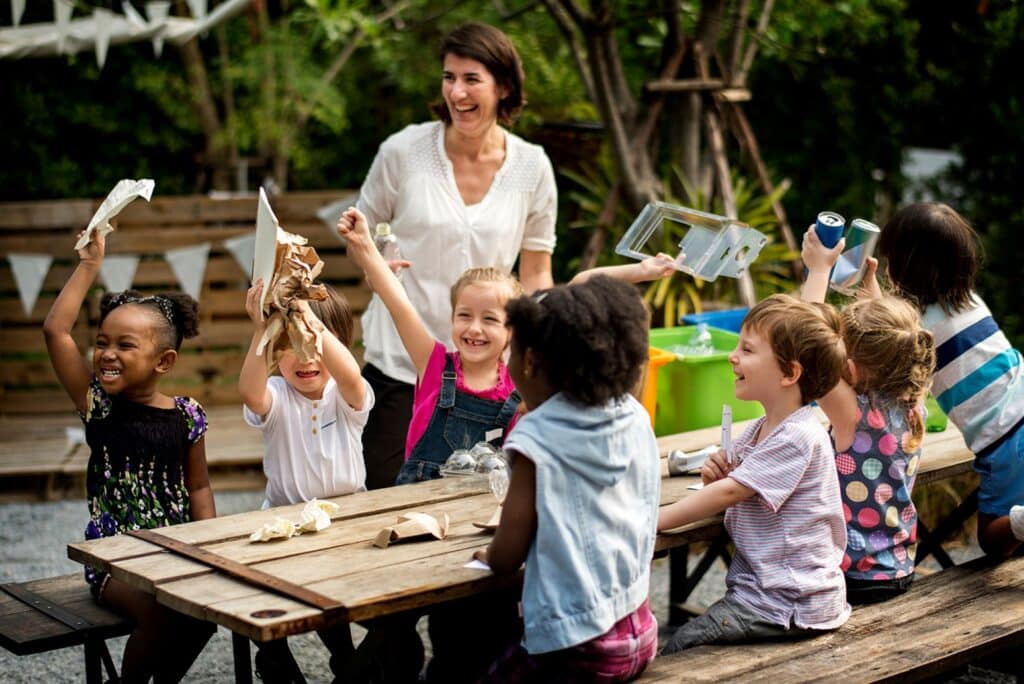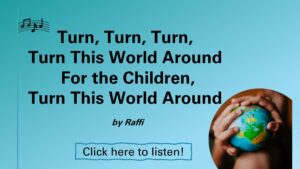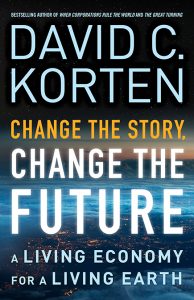April 30, 2024
Dear Friends,
In March, I received a notice of a meeting of the Advisory Council of the Raffi Foundation for Child Honouring. Raffi Cavoukian is a long-time friend and colleague and I’m honored to serve on his Council. You likely know Raffi as the children’s troubadour, beloved by millions who grew up on songs such as “Baby Beluga” and the “Wheels on the Bus.” My personal favorites are “No Wall Too Tall” (the theme song for my book, Agenda for a New Economy) and “Turn Turn Turn, Turn This World Around, For the Children,” which could easily serve as an anthem for the human transition to an Ecological Civilization.
Raffi is a serious student of the science on early child development. Aware of how our early experiences shape our human relationships with one another and Earth, he is committed to assuring that the early childhood experience fulfills the essential needs of each of the world’s children.
In preparing for the Advisory Council meeting, I reviewed some articles in Raffi’s seminal 2006 anthology Child Honoring: How to Turn This World Around. He co-edited this collection with Dr. Sharna Olfman, a Professor of Clinical and Developmental Psychology. A defining message of the book is that our early childhood experience shapes our commitment to caring for one another and nature, qualities that are essential features of a viable human future. Dr. Olfman’s chapter on “Self, Identity, and Generativity” highlights the many ways in which contemporary childhood experiences suppress that development.
I echo this message in my recent “Eco-nomics” white paper, launched in our March newsletter. Correcting for the failure of modern society to nurture all children’s caring nature and potential becomes a defining priority if we wish to transition to an Ecological Civilization.
– David Korten
_____
For the Children

David Korten | April 30, 2024
We humans have developmental needs immediately following birth that far exceed those of other species. Perhaps the best way to get the modern world right for ourselves is to prioritize getting it right for our children as we prepare them to meet the distinctive needs and potentials of human life in an Ecological Civilization.
These needs and potentials are partly physical—such as the ability to stand upright and free our hands to create and use tools to reshape our physical world. And partly mental—such as our ability to choose how we relate to one another and nature. They also involve developing the healthy sense of self essential to our roles as caretakers of community.
Tragically, modern society separates newborns and the very young from nature and loving caretakers in ways that make such development very difficult. It encourages us to compensate by showering the newborn with material excess. The newborn’s actual need is better characterized as material sufficiency and relational abundance, which sets the appropriate lifetime standard for an Ecological Civilization.
Earlier humans met these distinctive post-partum needs through a strong caretaker bond between mother and newborn augmented by support from other members of family and their local village. In pre-industrial societies, infants were in almost constant bodily contact with their caregivers who responded immediately to their needs and never left them to cry.
It is a defining feature of mentally healthy humans that we get pleasure and satisfaction from acts of caring for Earth and other living beings. This human trait is foundational to the assumption that finding our way to an Ecological Civilization is within our human means.
A small portion of humans who fail to get proper care in their earliest years of life exhibit as adults a serious malfunction known to mental health professionals as narcissistic personality disorder (NPD). These individuals lack the normal human sense of empathy for and desire to care for others essential to a truly civil human society.
Early childhood is our time for learning to relate to other beings. Most modern societies, however, now structure adult lives in ways that make it difficult for parents to provide the physical and emotional care that a newborn needs. Corporate culture values the world’s children only as current and future consumers and sources of cheap labor. It is indifferent to their developmental needs and even hostile to an employed parent’s attention diverted from their employment responsibilities to address the needs of an infant child.
To imagine what proper early childcare might look like in a modern society, we can turn to Finland, which exemplifies how a modern nation can care for infants and young children as a national priority. Its 1973 Act on Children’s Day Care requires municipalities to meet the day care needs of all its children as a top national priority. The Finnish people refer to the system as “early childhood education.”
Finland has a goal of one adult caretaker for every four children in day care. Parents or grandparents who wish to care for their own children or grandchildren at home can opt to receive a government-provided childcare stipend to cover their time off from work. Another option is for two or more families to join in hiring a government-funded home care worker to care for their children gathered in one of their homes. Professionally staffed neighborhood daycare facilities are another option. All options are designed and managed to assure quality care that complements the family—without replacing it.
The Finnish early childhood educational and care program (ECEC) provides children nutritious meals, improves their immune systems through child-to-child contact, and prepares them for formal education. The experience centers on play, free discovery, collaboration, interaction, self-initiative, concentration, and learning to take responsibility for one’s own actions. This is sharply different from the focus on quantifiable metrics characteristic of so much of conventional education.
Finland’s experience, and that of most other European and especially Scandinavian countries, contrasts sharply with the United States. Here, the provision and regulation of early childcare and development is left up to the states, which vary widely, and are generally shamefully inferior to Scandinavian standards.
As we turn our attention from growing the incomes of the already rich to securing the wellbeing of Earth and all its people, it becomes evident that providing quality care for newborns and young children must become a top priority for people and their institutions all around the world.
An objective of the people of any civilized nation should be to assure every person has access to the essentials of a healthy and meaningful life. The dedicated support of loving, caring trained professionals is essential, but supplemental to parental care. Both are essential to our quest to find our way to an Ecological Civilization.
_____
Noteworthy …
The dreams of our young ones born into this world
Need respect and love to come alive
Honoring the children is what we need to do
Now is the hour and we’ve got the power to
Turn turn turn, turn this world around
For the children
Turn this world around.
Watch, listen, and sing along here…
From David’s latest paper, “Eco-Nomics for an Ecolgical Civilization“

“Every child needs both a family and a village. And every village needs its children. We are creating a world of isolated households and birthing children deprived of essential loving care. The further that process unfolds, the more difficult it becomes to reverse. This is our time to rethink and restructure how we live, recognizing that every life has a sacred purpose.”
_____
From the Book Shelf …
“To assess how well the economy is serving living people, we properly look to indicators of life satisfaction, nutritional health, creative expression, freedom from chronic disease and psychological dysfunction, the frequency and quality of interactions with people and nature, the sense of contribution, and the allocation of time between activities that bring intrinsic satisfaction versus those we simply endure to make money. The most powerful indicators of healthy community function are indicators of the health and well-being of our children.” (Page 111)
_____
For more Newsletter Essays, visit HERE… If this newsletter was forwarded to you, please sign up HERE to receive your own copy.


